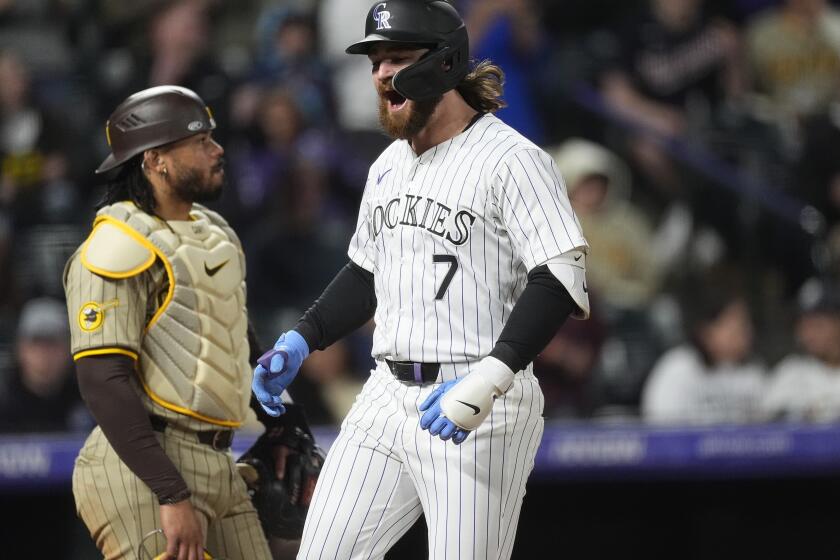Super Bowl shouldn’t sway stadium vote
The owners of NFL teams, those avariciously wise heroes who earlier this year decided the Chargers belong in San Diego at least another season, did not on Tuesday formally award America’s Finest City a Super Bowl.
Oh well.
A report over the weekend suggested the men who run the league would contingently bless America’s Most Desirous Super Bowl City as part of the enticement for voters facing the question of whether or not to contribute some $1 billion or so to help build a Chargers stadium and convention center downtown.
It would have been news, for sure, had that been a result coming out of the owners meeting in Charlotte, N.C. It is no small thing to be awarded a Super Bowl.
But, uh, duh.
With a new stadium, San Diego will once again have the opportunity to host the game it has hosted three times before, most recently in 2003.
Roger Goodell came to town for the rally that kicked off the Chargers’ signature drive last month and said a new stadium in San Diego would be a “perfect place for a Super Bowl.” That sort of declaration by the NFL commissioner does not slip off the cuff. Even then, his remark was accepted with a shrug. Like, “Of course, commish.”
Minnesota was awarded Super Bowl XLII, to be played in 2018, not because of its winter weather but because the Vikings will open their new stadium in August.
Being awarded the NFL’s championship game has become a reward to cities obliging a team in its quest for a new home.
See what did happen Tuesday. Owners awarded Super Bowls to Atlanta (LIII), South Florida (LIV) and Los Angeles (LV) – locales that will have new (or in the case of South Florida, significantly refurbished) stadiums.
With or without a formal guarantee of a future Super Bowl, there should be no change to San Diego’s electoral environment.
Besides the fact we already knew the Super Bowl would return to America’s Favorite Super Bowl Destination, even those who support public funds for a Chargers stadium should not be weighing the prospect of a Super Bowl heavily in their decision.
Sign the Chargers initiative because you think the convention center portion of the proposal pencils out. Or because you think a major city must include major-league teams. Or because your blood is not just blue but also gold.
But do not sign – and eventually vote “yes” – to help build a new stadium because it will host a Super Bowl (or Bowls).
The only guarantee that would come with such a guarantee is that the Super Bowl is a one-time event with questionable economic impact.
Let this be clear: The Super Bowl is a wonderful event for a city to host. Like having a team, the prestige of being a Super Bowl host lends to a city’s image as a major player.
However, we don’t know how many Super Bowls San Diego will get nor what it is we get.
It costs about $50 million to secure a game. That money comes from private/corporate donors. But city governments pay, as well, primarily for safety services, and there is much debate each year about whether municipalities recoup those costs.
Additionally, there is laughable disparity in the various estimates of the economic benefits associated with hosting the NFL’s premier event. The league (and other independent researchers) tout numbers like $500 million or more in impact to a local economy. Multiple dubious economists, however, say the actual benefit is far lower, some even claiming it to be somewhere between negligible and zero when factoring in staging costs, tradeoffs and stadium construction costs.
Regardless of where the actual impact lies – it’s difficult to believe the week doesn’t bring in some extra money – the questions beg caution.
Also, remember that the world’s most expensive/magnificent stadium is being built just up the road in Inglewood. So if you’re envisioning San Diego being part of a “rotation” for the big game, understand there is competition in Southern California.
There will be no more ideal place for Super Bowl festivities than downtown San Diego. (It was virtually unanimously held our city was the best place for a Super Bowl when the game was in Mission Valley.) But San Diego’s enchantment will dim in the shadow of the investment made by Rams owner Stan Kroenke and the NFL in their Inglewood palace.
There is also competition from South Florida, where the Dolphins spent $450 million to update their stadium and on Tuesday was awarded its next (11th) of what is likely multiple more Super Bowls. There remains New Orleans, always and forever a favorite host, and the 49ers’ stadium in Santa Clara that hosted this year’s game. No one can think that Dallas and Houston are finished hosting the game. Oh, and Las Vegas when the Raiders relocate.
Last year, an NFL official said emphatically that the league would eventually settle back into a rotation and that a new stadium in San Diego would be part of that cycle. But that was not a quote for attribution, which makes it as binding as a high five. In fact, Goodell indicated a couple years it is not a given that the league will award future Super Bowls on a rotation basis.
Again, to be clear, hosting the Super Bowl is a good thing. Even one every 10 years is not trifling.
But consider it a bonus, not a deciding factor.






